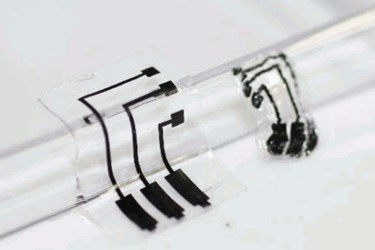Will Stretchy Hydrogels Usher In A New Era Of Implantables?
By Joel Lindsey

A group of scientists from Japan’s Tohoku University has developed the first pliant and durable electrode-hydrogel hybrid — a device that researchers say could greatly impact the fields of wearable and implantable medical devices, as well as tissue engineering.
“Our study paves the way for the development of complex electronically responsive and spatially controlled nerve muscle cell co-cultures, opening a new avenue of ‘intelligent biorobotics,’” researchers wrote in their paper published in Advanced Healthcare Materials.
Researchers began by building a flexible and stretchable electrode by combining PEDOT, a polymer that is both biocompatible and electrically conductive, with polyurethane, a commonly used elastic substance. Once this electrode device had been built, researchers then deposited it onto a flexible yet durable double-network hydrogel, according to a recent Asian Scientist article.
In early tests, the electrode-hydrogel device retained both its shape and its electrical conductivity after being repeatedly bent out of its original shape 100 times, being stretched to twice its length 100 times, being immersed in water for six months, and undergoing the widely used sterilizing process of autoclaving, in which pressurized steam of up to 120° C is applied for as long as 20 minutes.
In addition to testing how well the device endured these various alterations and environmental elements, researchers also tested the biocompatibility of the new device, confirming that neural and muscle cells could adhere to the electrode-hydrogel and then go on to grow, proliferate, and differentiate.
All of this may mean that the new device could be effective in a variety of implantable applications. It could also help advance the field of tissue engineering, potentially paving the way for the development of new integrated electronics, according to the article.
Details and results from these tests have been published recently in the journal Advanced Healthcare Materials.
“Their response to repeated bending, mechanical stretching, hydration-desiccation cycles, storage in aqueous condition for up to 6 months, and autoclaving is assessed, demonstrating excellent stability, without any mechanical or electrical damage,” the team wrote in the journal article. “The hybrids exhibit a high electrical conductivity of up to 120 S cm−1 at 100% elongation. The adhesion, proliferation, and differentiation of neural and muscle cells cultured on these hybrids are demonstrated, as well as the fabrication of 3D hybrids, advancing the field of tissue engineering with integrated electronics.”
Image Credit: Tohoku University
